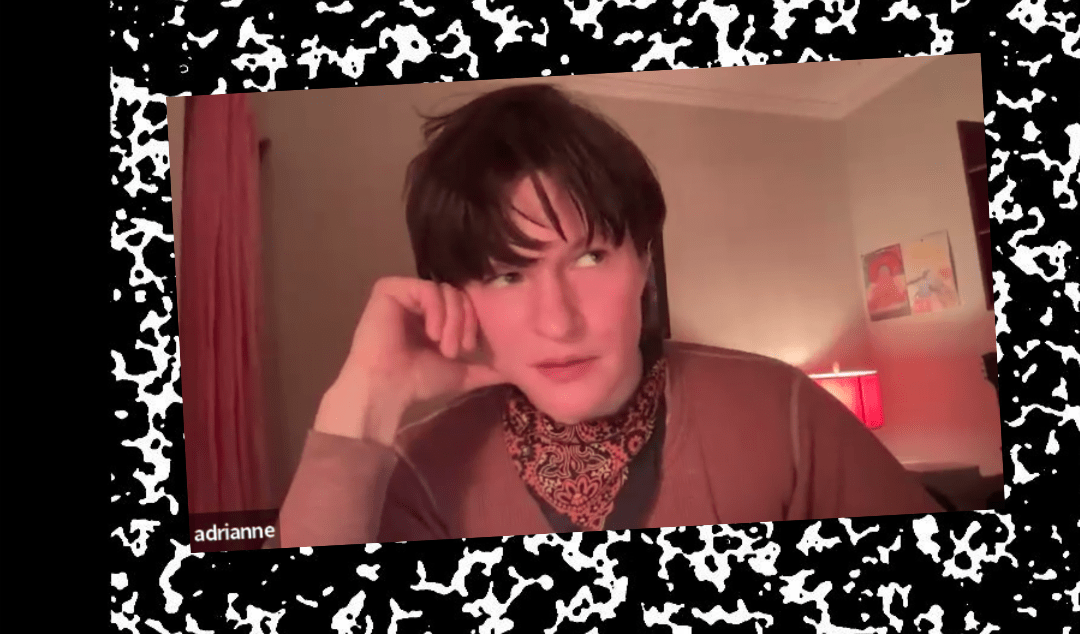"Of course your voice is good. It's yours. How could a natural voice be bad? Criticizing someone's voice always appalls me because it's like criticizing someone's cheek."
As we sat in our final evening of a three-week songwriting workshop, Big Thief's Adrianne Lenker once again shared a creative thought that was equal parts constructive and poetic. She was responding to a student question about how Lenker has used her internal self-editor to help find her voice. As usual, the answer sounded at once simple and obvious, while also like something that I (and hundreds of other songwriters on our weekly Zoom call) needed to hear.
For each of the last four Sundays, I have been attending Lenker's workshop through the School Of Song, an online songwriting lab that offers live, participatory sessions taught by renowned artists like Robin Pecknold (Fleet Foxes), Taja Cheek (L'Rain), and David Longstreth (Dirty Projectors). Lenker was their latest artist in residence, teaching multiple hour-long sessions over Zoom each week to an audience of hundreds from around the world. She clearly built the lectures herself – robust and thoughtful reflections on her process filled with song analysis, personal drawings, and personal tips to help open up new creative pathways for her students. Classes were recorded for the folks who couldn't join live, and a lively community blossomed both in the Zoom chat and on a dedicated Discord for School Of Song. Best of all, we had direct access to Lenker – she ended each lecture with roughly 15 minutes of live Q&A, with an additional hour-long Q&A session taking place every Wednesday night.
Like many in the room, I took this class as a means to unblock myself. I'm in my early 30s and I had just finished an intensive EMBA program in December. It left me with a stronger sense of how to read a balance sheet but also drove me to find a new therapist. I'd received the $160 tuition for Lenker's class as a Christmas gift from my mom, an encouragement to dip myself back into creative waters after the hard work of the previous 18 months. But if I'm honest, I'd been in a creative rut long before that. Some combination of working from home, getting married, and moving to Brooklyn and back meant that I had not written a full song in years, despite dozens of voice note snippets captured during my jogs around Philly.
School Of Song offered an opportunity to reset. After each lecture, we were given a prompt based on Lenker's lecture topic that aimed to push us out of our comfort zones. The end goal was always the same: write a song and upload a recording of it to our class "jukebox" website for a live Saturday song-share with some of your classmates.
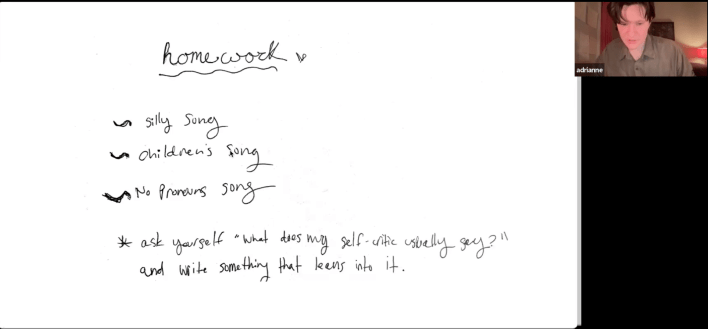
Perhaps weirdly, I had never considered taking a songwriting course before. Despite majoring in creative writing and participating in weekly poetry seminars throughout college, songwriting always felt like something that you primarily did alone. In my high school band I wrote the songs as solo pieces and fleshed them out with my friends, while in college and after I played alone in bars and busked on various Philadelphia street corners. And yet when I saw the announcement on Stereogum back in November, learning from Lenker felt like a curious, once-in-a-lifetime opportunity to pull myself back into the creative slipstream.
Though I'd enjoyed their 2016 Saddle Creek debut Masterpiece, "Mythological Beauty" from 2017's Capacity is the first Big Thief song I ever really obsessed over. (I'll forever maintain that the titles of their first two albums should be flipped.) The interlocking melodies, the sharp doubling of Lenker's raw vocal with Buck Meek's guitar, the incredibly specific and strange scene-setting ("Rented a house in Niswah, Minnesota/ Shrapnel and oil cans, rhubarb in the yard“) sent me into a spiral. Since then, I've followed the band with interest while picking and choosing my entry points. While I'm happy to debate their catalog*, only one of their records has ever been in my year-end top 10, and I'm not on YouTube watching live tour debuts. Yet their musical output is impressively rangey, and Lenker's songs seem to spring from a rare kind of deep well – not quite mid-‘60s Dylanesque, but tapping into that same pure electric current where you can tell her antenna is picking up frequencies that most writers only dream of tapping into. It felt like she would have some knowledge to share that wouldn't lead me to writing a bunch of Big Thief knockoffs.
*Dragon > Two Hands > Capacity > UFOF > Masterpiece if you want to argue in the comments.
Lenker's teaching style is somewhere between a resident advisor and a spirit guide. She does not present herself as any kind of "authority" or "expert" in the traditional mode, but rather a fellow practitioner who is interested in deepening her relationship with songwriting and willing to go on the ride with you. She was personally invested and generous with her own process, whether that was by describing the song "seeds" that she moves from one notebook list to a "finished pile" when they're complete, or providing colorful handwritten drawings of her most oft-used fingerpicking patterns and open tunings.
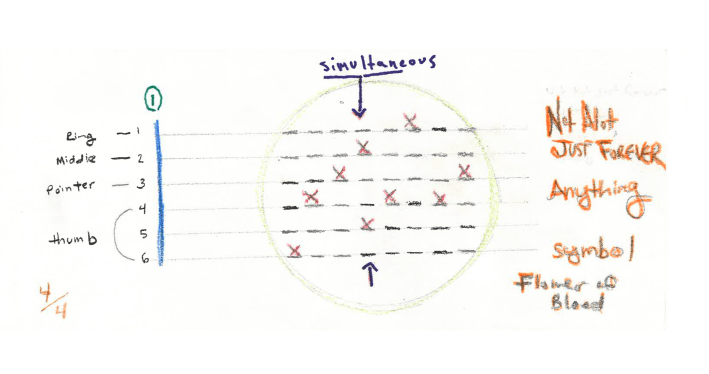
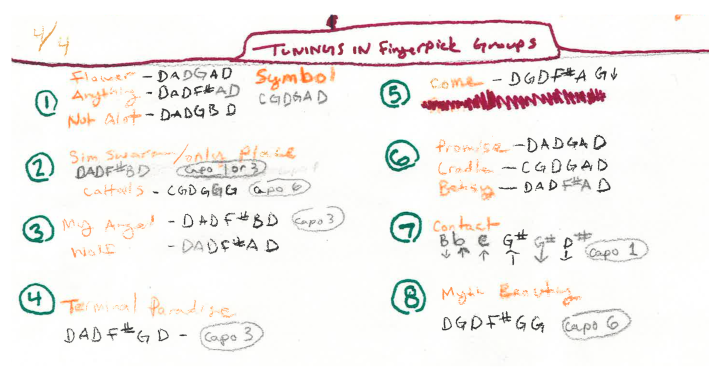
We also looked at other writers that she enjoyed, analyzing songs like Lucinda Williams' "Minneapolis" and John Prine's "Far From Me" to talk about the merging of descriptive, literal language with more confessional and symbolic abstractions. Lenker played the songs live as she spoke about their storytelling turns and color-coded the lyrics, in a manner that reminded me of the person-to-person connection of pandemic-era livestreams. It's strange to be nostalgic for that horrible time, but this workshop underscored for me the ways in which we do actually have the ability to slow down and say "hello in there" to each other if we want to.
We rely on reader subscriptions to deliver articles like the one you're reading. Become a member and help support independent media!
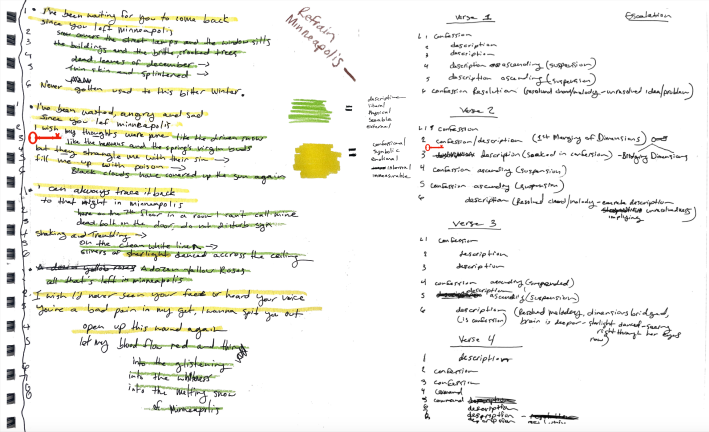
Our Wednesday night Q&As were by far my favorite session of each week, as Lenker would essentially sit in her bedroom, sometimes holding a guitar, and open the floor to all sorts of questions about process from folks around the world. She came to each student's question earnestly, with the self-presence to not feel obligated to deliver some kind of overly definitive instruction. It felt more like she was brainstorming with us on each topic or having a collegial discussion than dictating How To Write Songs, though she always had keen and practical insights… even as the questions got increasingly metaphysical ("How do you maintain the soul of a song as you work on it over a long period of time?"). It feels trite to summarize her lengthy, thoughtful responses in short bullets, but here are a few learnings that stuck to my ribs:
- The deepest songs can be light and playful, and play in its purest form comes from the same place as sadness.
- If you've been having trouble finishing a piece and it takes a while, maybe you just weren't ready until now to write the words you need.
- One great reason to write a song is the words that it opens up for you to sing and play. "You sculpt this thing that over time, it works on you too."
- Use language and musical motion to throw yourself out of context intentionally. Let the part that's creating react to what's happening in the song.
Big Thief fans (and there were certainly a few die-hards in the endlessly buzzing Zoom chat) could not have asked for a better window into the mind of one of our scene's more exciting songwriters. We used a number of Big Thief tunes and Lenker’s solo songs as examples of different writing exercises, and at times our class felt like a Genius breakdown that was less focused on lyrical decoding and more focused on structure, tone, and intent. There were skeleton keys to her writing style, as well as fun production Easter eggs – like Lenker offhandedly mentioning that "Promise Is A Pendulum" (one of my absolute favorite Lenker compositions) is simply a voice memo she made laying down with her phone resting on her guitar body. Lines like "the last one there is a potato knish" in "Spud Infinity" will now always ring out to me a little differently after listening to her lecture on the role of humor and wordplay. It put into context Big Thief's latest effort Dragon New Warm Mountain I Believe In You, an endlessly deep well of a double album that I consider the band's masterpiece for its tapestry of wandering sounds and moods. Everyone who attended Lenker's workshop understands where that spirit comes from just a bit better now.
Lenker shared so much of herself that it's fun just to remember small moments. She made up (maddeningly solid) verses on the spot to demonstrate a point, and learned the acronym DAW over the course of our class. She quoted Lord Of The Rings multiple times, shared Mary Oliver poems, showed us her paintbrushes, and talked about her dog. She demonstrated how she thinks about humor in language by playing us a silly unreleased song ("Cactus, Practice,” complete with whistling). She sketched small frog drawings, elaborated on how much she enjoys food puns, and used phrases like "sculpting subconscious abstract flow into an intentional form with contours and cadence to it." It's indicative of the openness and intimacy of her art that she just let this all flow out to hundreds of strangers for hours and hours each week. If you're a fan of her music, I'm not sure what else you could hope for.
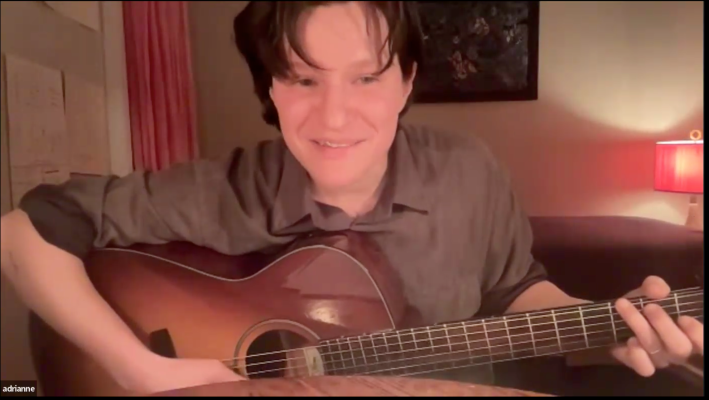
I'm also happy to report that School Of Song did, in fact, help our class write songs! Hundreds of them, in fact, uploaded each week into a web portal that resembled a clean yet rambunctious timeline of sounds and ideas, each crafted through some combination of the pressure to have something to share and the encouragement of the community. It was kind of incredible – sort of a private, shared version of SoundCloud or Bandcamp, with profiles and descriptions and comments and playlists. The site made our workshop community feel tactile, a connection point that would later extend over email and Discord to invitations for in-person meetups and co-writing sessions. Folks are still sharing new songs as I type this.
It was hard work to shake off the cobwebs. Lenker and the School Of Song TAs encouraged a "more is more" approach. Their process is to write as much as you can as an unblocking method, a separate version of yourself creating your songs than the one deciding on whether to edit or share them. Our weekly class prompts unlocked that creativity for me in different ways: freedrawing for 10 minutes as a starting point, or giving us a really rigid lyrical structure to fit into over cowboy chords, or using our intuitive compasses to feel around for notes and sounds. I spent hours late into the night searching on my acoustic Takamine guitar, usually in our basement so as not to disturb my wife's sleep. Each week, I could feel that familiar glow as the words locked into place in my notebook, or the little open-tuning riffs that sounded kind of cool but I had trouble singing over got easier to play. I'd make one-take voice memo recordings on my phone and go to bed at 1AM, exhausted but satisfied.
We had online song circles every Saturday. It was a series of vulnerable moments, as songwriters from around the world – I connected with folks from San Diego, London, Burlington, Galway, Chicago, Madrid, Arizona – were put into small breakout rooms, invited to share their song, and discuss it for around 10 minutes with strangers. We were encouraged not to "lead with disclaimers" while sharing our songs; that everything we share is part of this process, that it's inherently valuable and doesn't need qualification. Conversation was centered on positive feedback and what we took from the week's assignment; we'd politely chat about how someone's song reminded me of Ty Segall or how "nesting house" is a nice turn of phrase. It was an affirming and intellectual opportunity to talk about my creative process, an opportunity that I never get in my daily life.
I listen back to the five songs that I wrote in this period and I’m proud of them. They might not be going on a streaming service anytime soon, but there are seeds of something. I like their grunge-y chord progressions and mediocre harmonica interludes, their wordless vocalizations and Conor-Oberst-meets-Doug-Marsch-esque yawling. Most importantly, I like how the words sound and feel. They exist as an outlet for thoughts that have been swirling around in my head: the desperation of trying to treat chronic pain, or a reminder to be kind to myself. They exist as all songs do – markers of a moment in time, the chance to say something out loud that feels true to you.
I recommend that creatively-inclined folks with the means for a special purchase look into the School Of Song. Like many music lovers who grew up in the blog era, it has been so extraordinarily disheartening for me to watch the communities that helped form us get razed by greed. The folks at School Of Song are trying to build something new, a safe and distinct space for a world of artists to gather. I am not sure if School Of Song will make you into an incredible songwriter, but it helped me explore new ways of writing and tap back into that mysterious current. It enriched a month of my life and introduced me to a community of people that are all swimming in similar seas. And it helped me find my voice again.
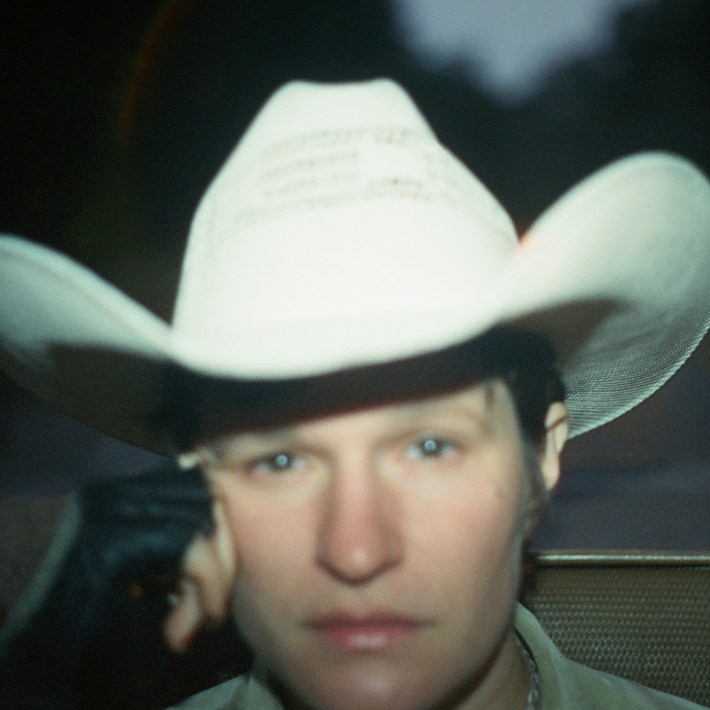
School Of Song's next songwriting workshop is in February, taught by Merrill Garbus of Tune-Yards. There are also "core curriculum" classes and a robust archive with Stereogum faves like Bartees Strange, David Longstreth, Meg Duffy, and Phil Elverum. Get more info here.
Lenker's new album Bright Future is out 3/22 on 4AD.
Images and quotes granted for use under exclusive license to Stereogum from School Of Song.
